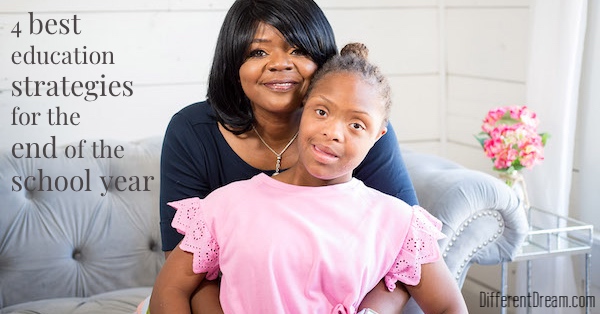4 Best Education Strategies for our Children with Special Needs

Lillian and Catherine practicing best education strategy #4
The best education for our special needs children is important to parents. Guest blogger Lillian Flakes writes about 4 strategies she and her husband employ to provide the best education possible for their daughter, Catherine.
It’s the end of the school year and summer is nearly here. This time of year is marked by so many events – fun field trips, end-of-year performances, field day and of course the final parent-teacher conferences. This conference snapshot is sometimes trying for parents for children with special needs because this is a space where we are looking at the “true” academic progress of our children.
It is a moment of transparency. Yes, many of us know that the goals our children reach are not in line with their actual age or grade level. Intuitively, we also know what our children have achieved, though it is sometimes sobering when you look at it in black and white on paper.
My husband Merle and I have these feelings every year, yet we continue moving forward in a way that gives Catherine the best chance at an education. We believe we can support her education with a few simple steps:
Best Education Strategy #1: Make your benchmark using a genuine view of your child.
My husband and I think of Catherine’s progress a bit differently. We do not look to see if she is progressing at grade level; we look to see if she is progressing at Catherine’s level. In other words, she is her own benchmark. If you try measure against the standards set by a particular school district or the state education board, you could simply go out of your mind. This could potentially derail progress. We take hold of where she is and build from there. Just the other day she mastered buttoning her shirt all by herself. Many children accomplish this task at a much younger age, but we knew Catherine would take longer because of her challenges with fine motor skills. Each morning, she proudly smiles when she completes this task. This satisfaction goes so far with her self-esteem and supports a “can do” attitude.
Best Education Strategy #2: Educate in a creative way.
There are some skills children with special needs will easily consume in the traditional setting. In other cases, we have to be creative to get the job done. Our children may require an extremely high level of repetition before they own a concept. Spelling tests are a challenge for Catherine and the worksheets she receives are a great start for her. To help her with spelling, we started word games where we place the letters on a card and unscramble them to spell a word. She sometimes has to spell a word in the shower or use it as a special password to get access to her favorite things. Most of the time she does not realize she is learning but we know she is. And, she’s having fun at the same time.
Best Education Strategy #3: Select specific tasks to work on over the summer break.
All students encounter a long day during the school year with a number of different subjects and activities. The summer is the best opportunity to conquer at least one skill or concept that your child may not fully absorb when school’s in session. Catherine can identify coins and their values pretty well. Over the course of the school year, her math teacher encouraged us to take her to the store to make an actual purchase. We plan on doing more of that this summer. I call it learning in action. Again, this offers an opportunity to hone in on a specific component of her education in a creative way.
Best Education Strategy #4: Take a much needed break.
Time away will do wonders. We live in such a fast-paced society where we have to overcome the hurdle before us and get to the finish line first. This is difficult as we look at the challenges our children face. Too often, we make the mistake of looking around at other children, both typical and with special needs, and we get distracted or start going down a rabbit trail that leads us nowhere. Summer is the perfect time to grow our children in creative ways. The extra time with family and the lazy time allows them to perhaps discover something they have never tried before.
We all want the best for our children! We just have to remember that we have so many opportunities to educate them in a way that will lead to a productive life and a level of independence.
Do you like what you see at DifferentDream.com? You can receive more great content by subscribing to the Different Dream newsletter and signing up for the daily RSS feed delivered to your email inbox. You can sign up for the first in the pop up box and the second at the bottom of this page.

By Lillian Flakes
Lillian is a wife, mother, primary caregiver advocate, and scientist. She is the proud mom of two girls, the youngest with Down syndrome. Her youngest daughter had a heart defect and other health issues that required 92 days of hospitalization her first year of life. Lillian is a natural problem solver and understands the challenges every caregiver can face with the overwhelming tasks of managing hospitalizations, numerous doctor appointments, medications, insurance claims along with balancing the care of family. As a key component of her blog, Beyond the Waiting Room, she provides a peek into her personal challenges along with resources, tools, new technology and inspiration. In addition, she often speaks to groups in the medical field about CARE (Compassion, Action, Respect and Education) the cornerstone of treatment for all patients.
Subscribe for Updates from Jolene
Related Posts
Managing Mixed Emotions When Our Kids with Disabilities Go Back to School
Guest blogger Kristin Faith Evans offers tips for managing mixed emotions when our kids with disabilities go back to school.
How Much Is Too Much to Tell Teachers about my Child’s Disability?
Guest blogger and teacher Maggi Gale asks, “How much is too much to tell teachers about my child’s disability?”
Parenting in Light of Neurodiversity
Guest blogger Lisa Pelissier explains some communications tips she’s learned while parenting and homeschooling her autistic son.






0 Comments